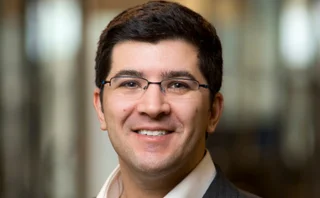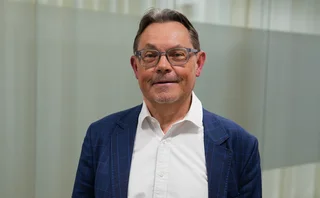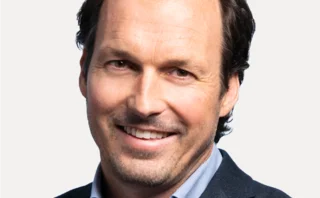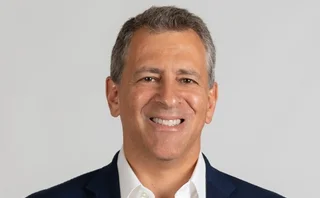
Commodity finance house of the year: Societe Generale
Energy Risk Awards 2019: Breadth, diversity and number of financing projects makes 2018 a standout year for French bank

For Societe Generale’s natural resources and infrastructure team, 2018 was a record year, with around 90 transactions arranged in the project finance domain. According to Project Finance International, the bank was number one globally for energy, mining and infrastructure, in terms of advising the total volume of project finance raised – at almost $30 billion of debt.
“I was delighted when I saw the number, as it reflects the breadth and range of transactions we were involved in for 2018,” says Olivier Musset, global head of energy at Societe Generale Corporate and Investment Banking.
Societe Gernerale’s bankers are particularly proud of the financing of the 420-megawatt (MW) Nachtigal hydropower project in Cameroon, a €1.2 billion ($1.35 billion) transaction that is the largest power project financing in sub-Saharan Africa to date. Once operational in 2023, the dam – under development by French utility giant EDF, the International Finance Corporation and the Cameroonian government – will account for 30% of Cameroon’s total installed power capacity.
“The most innovative part was that it allowed the participation of short-term local funding,” says Musset. While most of the debt has a term of 21 years – the longest term-loan yet made in the local currency – local lenders have participated in a €170 million tranche of seven-year debt. That tranche is backed by the World Bank and, if the local lenders are not in a position to roll the debt over after seven years, they will be reimbursed by the government.
“The main challenge here is the political risk, given how long-term our exposure is,” says Musset. “It’s a poor country, but with lots of economic growth potential. The deal is part of our strategy to grow in Africa, where we have a very large network. There are not so many banks with this ambition.” It will also deliver significant social impact, helping to alleviate a chronic shortage of power in the country, he adds.
The bank can also point to positive environmental impact with its Blauwwind offshore wind financing, one of the largest deals yet in the sector, and which created a number of benchmarks. Societe Generale acted as co-financial adviser, exclusive equity adviser, mandated lead adviser and hedge provider for the €1.26 billion ($1.42 billion) project financing and equity sell-down of the 732MW Borssele 3 & 4 wind farms off the Dutch coast.
“This project was more challenging than any other offshore project to date because of the potential merchant exposure if power prices fall below the floor price defined in the power purchase agreement,” says Musset. At the time, the two wind farms set a record low for the price at which an offshore wind farm will deliver electricity – at just €54.49 per megawatt hour ($61.28/MWh) for the first 15 years, after which the project will receive the prevailing wholesale power price. The financing depended on the lenders getting comfortable with a 20-year view of European power markets, Musset adds.
SocGen’s ability to provide an integrated financial advisory service to raise project finance debt and manage an equity sell-down process in parallel, as well as debt financing for the transaction, was a key part of the success of the Blauwwind project
Marco de Heer, Blauwwind project
Not only did the transaction involve the project financing, but it also simultaneously provided a partial exit for three of the original consortium partners. Shell, DGE – a subsidiary of Mitsubishi Corporation – and Dutch utility Eneco sold 45% of the project equity to Partners Group, a Swiss-based private equity house.
“SocGen’s ability to provide an integrated financial advisory service to raise project finance debt and manage an equity sell-down process in parallel, as well as debt financing for the transaction, was a key part of the success of the Blauwwind project,” says Marco de Heer, Blauwwind project finance manager.
SocGen is not only seeking to facilitate large-scale renewables: through its acquisition last year of Lumo, a French clean-energy crowdsourcing platform, it aims to help individuals make small loans to local renewables projects. In exchange for these investments, developers can benefit from incentives offered by the unique crowdfunding regulations in France.
“The governments of Europe will want to see local populations involved in the energy transition – feeling part of the process and benefiting from a sense of ownership,” says Federico Turegano, global head of natural resources and infrastructure at the bank. “This is about democratising the energy transition.” While Lumo is currently a small operation, there is potential to extend the model to other European countries, he adds.
But it is the breadth of Societe Generale’s commodity finance operation that makes the bank stand out, as well as its willingness to stand behind the conventional energy sector. For example, the bank advised and arranged financing for the Trans Adriatic Pipeline, the last stage of a giant infrastructure project, costing around €40 billion ($45 billion), bringing natural gas from Azerbaijan to Europe.
“We have been working on this advisory for six years; it shows the tenacity you need to make such projects work,” says Musset. The complexity involved, he says, lay in coordinating a project of that size across several jurisdictions simultaneously.
“We view ourselves as an energy bank in the broadest sense,” says Turegano. “While the energy transition will keep us all very busy for the next couple of decades, we have to recognise that the transition is a complex process that requires science and pragmatism; that it involves oil and gas and metals and mining infrastructure and not just renewables.”
Only users who have a paid subscription or are part of a corporate subscription are able to print or copy content.
To access these options, along with all other subscription benefits, please contact info@risk.net or view our subscription options here: http://subscriptions.risk.net/subscribe
You are currently unable to print this content. Please contact info@risk.net to find out more.
You are currently unable to copy this content. Please contact info@risk.net to find out more.
Copyright Infopro Digital Limited. All rights reserved.
As outlined in our terms and conditions, https://www.infopro-digital.com/terms-and-conditions/subscriptions/ (point 2.4), printing is limited to a single copy.
If you would like to purchase additional rights please email info@risk.net
Copyright Infopro Digital Limited. All rights reserved.
You may share this content using our article tools. As outlined in our terms and conditions, https://www.infopro-digital.com/terms-and-conditions/subscriptions/ (clause 2.4), an Authorised User may only make one copy of the materials for their own personal use. You must also comply with the restrictions in clause 2.5.
If you would like to purchase additional rights please email info@risk.net
More on Commodities
Energy Risk Asia Awards 2025: The winners
Winning firms showcase the value of prudent risk management amid challenging market conditions
Data and analytics firm of the year: LSEG Data & Analytics
Energy Risk Awards 2025: Firm’s vast datasets and unique analytics deliver actionable insights into energy transition trends
OTC trading platform of the year: AEGIS Markets
Energy Risk Awards 2025: Hedging platform enhances offering to support traders and dealers in unpredictable times
Electricity house of the year: Natixis CIB
Energy Risk Awards 2025: Bank launches raft of innovative deals across entire electricity supply chain
Voluntary carbon markets house of the year: SCB Environmental Markets
Energy Risk Awards 2025: Environmental specialist amplifies its commitment to the VCM
Sustainable fuels house of the year: Anew Climate
Energy Risk awards 2025: Environmental firm guides clients through regulatory flux
Weather house of the year: Parameter Climate
Energy Risk Awards 2025: Advisory firm takes unique approach to scale weather derivatives markets
Hedging advisory firm of the year: AEGIS Hedging
Energy Risk Awards 2025: Advisory firm’s advanced tech offers clients enhanced clarity in volatile times







